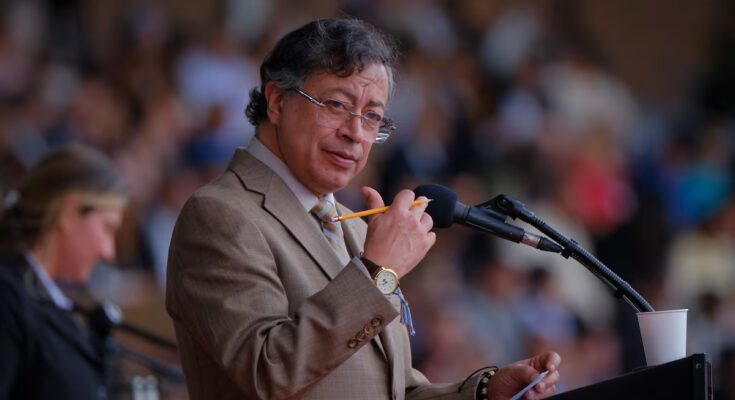This week, Colombian military forces carried out two attacks against pseudo-dissidents Ivan Mordiscoone of the most wanted criminals in Colombia and one of the greatest enemies of the peace that Gustavo Petro’s government seeks with armed groups. The president ordered attacks against his facilities in Arauca, a department on the border with Venezuela, and in the Guaviare jungle. In the latter, 19 people died, among whom the Office of the Ombudsman and Forensic Medicine confirmed this Saturday that there are at least seven minors. The fact that several children died casts doubt on Petro’s promise to respect international humanitarian law (IHL) in these operations, according to experts, who doubt whether the principles of distinction and proportionality were applied.
Before the agency confirmed the ages of some of the dead fighters (four bodies have yet to be identified), Petro and his defense minister, Pedro Sánchez, had already admitted the likelihood that minors were among them. The president assured Thursday during the police ceremony that attacks “always present a risk” and that, if intelligence fails, “it can fall on minors.” “This is the big risk that only the president takes. No official takes it. I am the one who makes the decision,” he said. This conjecture arose after learning that three forcibly recruited teenagers had been rescued in the same operation.
After the deaths of the seven minors were revealed, the president responded along the same lines. It was a “risky decision,” he said on social media, as that group of bombed dissidents was about to attack a platoon. “We had 150 heavily armed men alias Mordisco advancing through the Guaviare forest towards a platoon of 20 soldiers who I could have reinforced with ammunition, but they could also be ambushed or counter-ambushed. We would lose 20 young men in the service of the state and society.”
In even stronger words, Minister Sánchez, a retired career soldier, said on Friday: “Whoever gets involved in hostilities loses all protection, without any distinction. What kills is not age, it is the weapon itself.” The government’s position represents a radical change from the position that Petro defended on child soldiers during the years when the conservative Ivan Duque was in power (2018-2022). The left-wing president, then a senator, denounced that the attacks – like the one that occurred in March 2021, in which several minors died – were “child murders” and “war crimes”.
Laura Bonilla, deputy director of the Foundation for Peace and Reconciliation (Pares), explains that the Government’s arguments are insufficient. “Children are special subjects of protection during an armed conflict. The only way for them to lose this protection is if, for example, they take up a weapon in direct combat with the army. But this is not what happens in a bombing,” he says.
According to the expert, the military forces may have violated the principle of proportionality. It is the legal framework of international humanitarian law that establishes that attacks against military objectives cannot cause harm to civilians that is excessive in relation to the expected military advantage. “My interpretation is that this will not happen. There is desperation on the part of the Armed Forces in the face of the growth of dissidence. But even if an antibiotic can be useful for a bacterium, it does not necessarily kill the virus”, exemplifies Bonilla in a telephone conversation.
Petro, who lamented on the social network the “loss of human lives of the Colombians” “Their (the dissidents) route was from south to north, there was the danger that when they reached a point they would find 20 soldiers. What could they do? The ambush of 150 men, simply due to the numerical proportion, could end very badly (…). I decided that before reaching that point the place would be bombed”, he explained in his speech on Thursday.
From the Coalition against the involvement of boys, girls and young people in the armed conflict in Colombia (Coalico), they urge the government to always favor the principle of distinction for civilians and, above all, for children. “It is important to specify that international humanitarian law greatly qualifies the minister’s statement. They are protected and the international community recognizes them as victims, even if they have been used in hostilities. Saying that what kills is not age, but the weapon, ignores a legal reality”, says Andrés Aponte, coordinator of Justapaz, an NGO that is part of the coalition.
Experts point out that Colombia has an international obligation due to signed treaties, such as the Geneva Convention or the Convention on the Rights of the Child, which promulgate the distinction between combatants and victims of forced recruitment. According to the Ombudsman’s Office, 463 minors were recruited in 2024. Between January and June this year, the entity recorded 55 cases (Coalico brings this figure to 175). According to Aponte, in addition to the principles of distinction and proportionality, the State must guarantee the precautionary principle: “It is essential that operations are evaluated not only on the basis of the objective, but on the basis of the impact they can have on children”.
Ineffective attacks
Although bombings were taboo in the first half of his term, since last year Petro has ordered at least a dozen airstrikes against two facilities: dissidents Munch and the Gulf Clan, the largest criminal gang in the country. They are the groups that have put up the greatest resistance to the peace negotiations and which, together with the ELN, are most widespread on the national territory. The most recent attack was that of Arauca, launched on Thursday. I was trying to delete the aliases Antonio Medinaone of Mordisco’s trusted men, but so far it is not known whether he has been neutralized.
Andrés Cajiao, coordinator of the Conflict area of the Ideas for Peace Foundation, believes that bombings can exert pressure, but they only work if they are accompanied by other actions such as territorial control. “They were very important against the old FARC, who lived in the camps. This logic changes due to the way the new groups operate. Their structure is relative: usually the middle managers fall in these bombings and are very easy to regroup. Furthermore, they adapt more easily and can blend in in semi-urban areas with the civilian population”, he clarifies in a phone call.
The attack, and the resulting deaths of at least six minors, puts Petro in an uncomfortable situation. In the last two months he has been one of the Latin American leaders who has criticized the US military operations in the Caribbean Sea and the Pacific Ocean, which he does not hesitate to define as “extrajudicial killings” and “violations of international law”, an opinion which has been supported by the UN, numerous experts and human rights organizations such as Amnesty International. Therefore, for Bonilla, from Pares, the State must demonstrate that it has taken all precautions before carrying out the air attack.
For now, the government’s position has the support of an important body: the Attorney General’s Office. Attorney General Gregorio Eljach said Friday that minors raised in arms are “delinquents, criminals and they are on the other side of legitimacy, of legality, it is legitimate and it is legal to act” against them.



